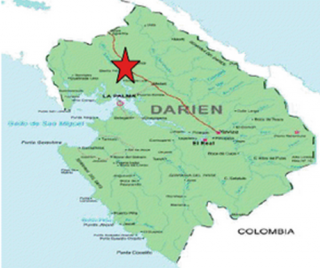Canglón, Panama
![]()
![]()
![]()
![]()
![]()
![]()
![]() Click on Programs to learn more about their work in this community
Click on Programs to learn more about their work in this community
General Information

| Population* | 725 |
| Number of homes | 183 |
| Avg # of people per home | 4 |
| Electricity | Yes |
| Corregimiento | Metetí |
| District | Pinogana |
| Corresponding Health Center | Centro de Salud – Metetí |
| Distance from compounds | 40 minutes from Tortí (can take up to an hour with the Senafront) |
| Road conditions | Average |
* Population does not reflect how many patients will be seen on medical
brigades as many people from surrounding communities come seeking
Medical Brigades medical attention.
Expressed Needs and Capacities
The top priorities for improvement expressed within the community are water, healthcare, and road infrastructure.
Canglón’s educational system includes a primary school with nine teachers. The school has about 133 students, that attend classes between 13 classrooms. The school is located in the center of the village. The closest secondary schools can be found in Metetí, which can be reached in approximately 40 minutes by bus.
The water situation in Canglón is poor. They have a system in place that supplies the community, however it arrives with low pressure and is often dirty. There are two aqueducts in the community, and one pump, though with minimal experience the system regularly needs repairs. They have invested in a system that ensures the water is chlorinated and has a filter. Within the community they have 2 different water committees, with 7 individuals in each one, though the membership changes often. During the summer the aqueduct can run out and the community does not have a reserve tank.
Canglón has a small health center, though there is a doctor there only some of the time. The closest corresponding health care facility is in Metetí, about 40 minutes away, which costs about $2 by bus. For dental access, they have to travel to Metetí as well.
The most common illnesses seen within the community are diarrhea, fever, and the common cold. The community does have a health committee, though there are no individuals with medical training within the community. Only 19 houses within the community have cement floors; the remainder with either wooden floors or dirt. Only 6% of houses have flushing toilets connected to the water system.
For members of the community, the main form of employment is agriculture on privately owned farms. Community members cultivate rice, yucca, ñame, and corn.
Local businesses in the area consist in five small stores that sell staple foods and snacks, as well as 2 bars. The community's only access to credit is through the community bank that was established and is supported by Global Brigades in early 2015. The community works with a governmental organization MIDES (Ministry of Social Development) which provides trainings and workshops for the economic and social development of the community.
In this particular region of Panama, no recycling or trash collection system has been established to aid community members in waste management. Canglón has not reported any locally based initiatives to reduce or reuse waste, and community members burn their trash or throw it in nearby bodies of water as the main form of disposal. The majority of all farmers with money use herbicides on their crops and plants. Everyone in the community practices slashing and burning. The community has never had any reforestation projects. There has been no form of environmental education programs within Canglón. There is no environmental committee in the community.
There are no lawyers in Canglón; they must travel to Metetí or Yaviza to receive legal services. The most common legal conflicts in the community are child support, child custody, divorce, marriage, and domestic violence.
Within Canglón, they have received workshops from MIDES (Ministry of Social Development) and have also worked with Fundación Pro-Niños, a local NGO that works with children in the region. They have also received medical workshops from SENAFRONT, but they needed to travel to Yaviza in order to attend.
Currently, only Business and Microfinance are working within Canglón. The community has participated in nearby medical clinics hosted by Medical Brigades.
Source of information: Key informant interview
Date of interview: January 26, 2016